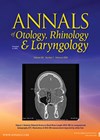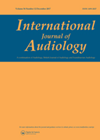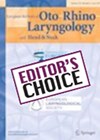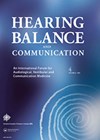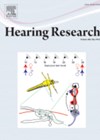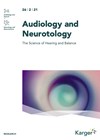
Journal Reviews
Starry eyed?
Attentive listening and active listening skills suggest that eye movement is an important factor in subject engagement. Indeed, when asked, AI suggests gaze is held for 70% of the time when listening. Although the route of this percentage is unclear,...
Keep on moving
This study compared the differences in localisation of sound between those with symmetrical hearing within normal limits (NH) and those with single-sided deafness (SSD). Unsurprisingly, those with SSD took longer to localise sounds and had a higher error rate. Although...
Spirituality and tinnitus – blocking out the haters!
The brain is fantastic at blocking out unwanted noise. Place a microphone on your temporal bone and you’ll realise you are subject to a relentless bombardment of sound you’ll never consciously hear: the clicking of your temporomandibular joint, the pulsating...
The cocktail party conundrum
I feel, with slight sadness and disappointment, that a good cocktail party, dresses, punch bowls and all is not currently in its heyday and, therefore, opportunity of attending is slim. However, from what I remember, they tend to be a...
Meaningful life changes following hearing aid use: a qualitative user perspective
Part of a larger survey on hearing aid outcomes and experiences, this US-based study explores meaningful life changes due to hearing aid use in adults, with the aim of contributing to and improving all aspects of aural rehabilitation for this...
Occupation, role and performance in adults: a comparative study
The authors investigate the occupations of adults with cochlear implants (CI) compared to those with hearing impairment without implants (HI) and individuals with normal hearing (NH). A total of 204 participants were included: 98 CI users, 52 HI individuals and...
Management of post-tonsillectomy bleeding with nebulised TXA
In the last 20 years, rates of adult tonsillectomy have fallen in the order of 50%. The flipside to this, is that the number of admissions of patients with acute tonsilitis is more than double the reduction in tonsillectomy rates....
Hear me out – tiny steroid implants for fighting meningitis-induced deafness
Sensorineural hearing loss is the most common neurological complication of pneumococcal meningitis. Bacterial infiltration into the inner ear triggers inflammation, leading to cochlear fibrosis and sclerosis – damage that, in over a third of cases, affects both ears. Current Infectious...
Loudness tolerance levels and misophonia
Misophonia is a prevalent condition, yet its assessment and management remain underrecognised by many audiologists. Current literature highlights the frequent co-occurrence of misophonia with tinnitus and hyperacusis. Hence, the link between loudness intolerance problems and misophonia has been hypothesised by...
Not to be mis-underestimated
It is a very rare occurrence to find a paper looking at NF2 and the auditory system. There seems to only be a couple on NF2 prevalence in the population, so this is unsurprising. As far as I can recall...
Auditory processing disorder (APD): knowledge and practice in hearing healthcare
Awareness and practice for children and adults presenting with APD is variable across healthcare practice. Recently reported experiences of individuals and their families affected by APD show difficulty accessing referral and overall lack of recognition, and note that audiologists show...
Current AI audiology knowledge
Artificial intelligence (AI) tools are becoming increasingly popular and can be utilised by patients, healthcare professionals and students. The performance of chatbots can be variable between different AIs and, indeed, different topics. There is no current consensus for the best...



